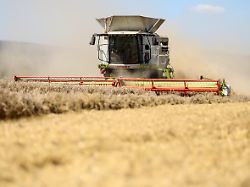Wheat below previous year’s level
Farmers complain about crop losses
08/22/2023 12:32 p.m
Not everything has been harvested yet, but the farmers’ association is already giving an initial assessment. Rain and storms therefore ensure a narrower grain harvest, especially wheat. Nevertheless, the association is optimistic about consumer prices.
After frequent rains this summer, German farmers probably brought in a smaller grain harvest. As things stand at present, it is questionable whether the mark of 40 million tons can still be reached, the farmers’ association said. This would be significantly less than the previous year’s amount of 43 million tons of grain. Heavy and frequent rain in large parts of Germany have repeatedly slowed down the harvest.
In some regions, there is still wheat in the fields that should have been harvested long ago. Rain and storms caused significant damage in some cases, which led to reduced quantities and qualities. Farmer President Joachim Rukwied called this year’s harvest a “real nail-biter”. A wet spring followed by drought in May and June and a harvest that was constantly interrupted by precipitation presented the farmers with enormous challenges.
According to the association’s provisional estimate, the yields for wheat, the most important cereal variety, are likely to be well below the previous year’s level. Only in the case of winter barley, which could be harvested before the rainy season, did the harvest increase. In the case of winter oilseed rape, a smaller harvest is to be expected despite an increase in the area under cultivation.
Stable consumer prices
Rukwied said: “This year’s weather conditions show once again the clearly noticeable effects of climate change. We must do everything we can to be able to secure our yields and food supply in the future.” This included the breeding of more resilient plants, a wide range of active ingredients for crop protection, water-saving tillage and the promotion of an irrigation infrastructure.
With regard to the development of consumer prices, however, the President of the German Farmers’ Association is optimistic and assumes that prices will remain stable in the future. “At the moment we have a stable and secure supply,” says Rukwied in the ZDF morning magazine. “We have a different situation in other parts of the world, for example North Africa, the Arab region, Asia,” explained Rukwied. The Ukrainian grain is missing there, which is now staying in Europe, but where it is not needed. Farmers only have a limited influence on the prices that retailers charge consumers for food.
